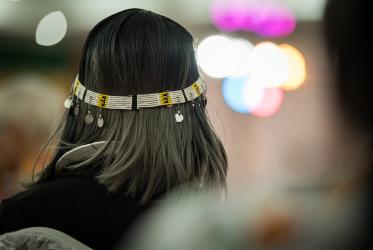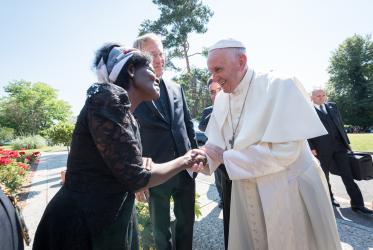As organizations across the globe promote strong measures against climate change, the World Council of Churches (WCC) and the Geneva Interfaith Forum on Climate Change, Environment and Human Rights organized a side event to the United Nations Human Rights Council on 22 June, themed "Human Rights and Climate Change: Spiritual Dimension and Negotiations towards Paris".
The event, a part of the WCC’s strategic build-up towards its activities around the United Nations Conference on Climate Change in Paris (COP21), facilitated discussions on climate change and human rights from ethical and spiritual perspectives. At the event was a panel of representatives from faith-based organizations and missions concerned with issues of climate change, justice and human rights.
One of the panellists, Archbishop Silvano M. Tomasi, permanent representative of the Holy See to the United Nations in Geneva, took his departure in the recent announcement of the Pope’s Encyclical “Laudato Si”. ”What the Encyclical does is not to take a scientific approach to climate change. Rather, it takes into account what has been stated by scientists, but translates it into a strong spiritual dimension so that it can be understood as fundamental also to faith communities,” he said.
Nahida Sobhan from the Permanent Mission of Bangladesh to the UN in Geneva commented, “As human rights are directly affected by climate change, and the vulnerability of different people varies widely across communities and countries, it is crucial that we achieve a binding agreement at COP21.” “The agreement must be based on the values of equity, fairness and dignity,” she added.
Isaiah Toroitich, global policy and advocacy coordinator at the ACT Alliance, stressed that climate change is not only an environmental issue, or an economic issue, but also a spiritual issue. “Personally, coming from Kenya, I have seen how climate change affects how you build your communities, how you carry out your agriculture, and how, or even if, you can put food on the table,” he said.
Yves Lador, permanent representative in Geneva for Earthjustice, commented,that the “agreement to be made at COP21 is actually directly linked to a world order that came out of the World War II, a world order which simply does not deliver any more.”
The panellists agreed that COP21 outcomes must be the starting point, rather than a fixed framework. Yves Lador said, “At COP21, I believe we will be working with the voluntary undertakings that states bring to the negotiation table. I am hopeful that we can move beyond merely discussing the environment, and succeed in protecting human rights in all climate change-related respects, including issues of gender rights, indigenous people’s rights, and more,” he concluded.
Video report of the event by Pax Press Agency
Pilgrims on the move towards COP21 and climate justice (WCC news release of 11 June 2015)
More information about the WCC’s work for climate justice
ACT Alliance campaign Act now for climate justice








